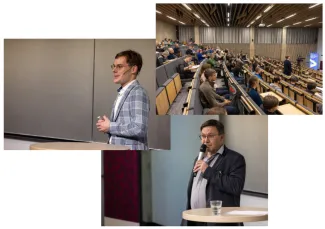
On November 26, NCC Estonia, Estonian Scientific Computing Infrastructure (ETAIS) and the University of Tartu co-hosted a Data Science Seminar “Driving Innovation with High-Performance Computing”. The event was open for all those interested in discovering the exciting world of supercomputers, high-performance computing, and their possible uses. ETAIS aims to increase the competitiveness of the Estonian…

On November 26, NCC Estonia, Estonian Scientific Computing Infrastructure (ETAIS) and the University of Tartu co-hosted a Data Science Seminar “Driving Innovation with High-Performance Computing”. The event was open for all those interested in discovering the exciting world of supercomputers, high-performance computing, and their possible uses.
ETAIS aims to increase the competitiveness of the Estonian computing and data-intensive research disciplines by providing access to a new and modern scientific computing infrastructure. The immediate aim of the core infrastructure is to manage the joint scientific computing infrastructure established for Estonian R&D, which allows Estonian researchers successfully operate in computing and data-intensive research disciplines.
Dr Ivar Koppel, director of ETAIS, mentioned in the opening speech that high-performance computing allows researchers to solve the most complex challenges quickly and even explore areas where experiments are unthinkable. These are some main reasons why successful Estonian companies apply supercomputers for innovative R&D activities, cost reduction, and competitive advantage.
One of the most exciting talks was “Honey bulk DNA metagenomic analysis using University of Tartu HPC Centre”, conducted by Priit Paluoja, Head of Data Management at Celvia CC. Celvia is an Estonian company and research institute that is paving the way from basic research to genetic testing. The company has created a globally unique DNA test that helps reduce fraud in the industry, protects the interests of consumers and producers, and supports the export potential of pure Estonian honey.
Another success story was presented by Hardi Hakk, Head of Aerodynamics at the Formula Student Team. His talk “HPC usage in engineering practices for Formula Student” described how Formula Student Tea applies computational fluid dynamics to improve the aerodynamic properties of racing cars. The team has been engineering vehicles since 2006 and they have won numerous trophies from all around the world.
The attendees also had an opportunity to hear how HPC empowers various data-intensive research areas, such as archaeogenetics and Large Language Models. The event ended with networking.
The recording of the seminar is available on YouTube.
Companies wanting to perform large-scale calculations or store data on Estonian e-infrastructure are welcome to contact ETAIS, the University of Tartu HPC Centre or NCC Estonia.